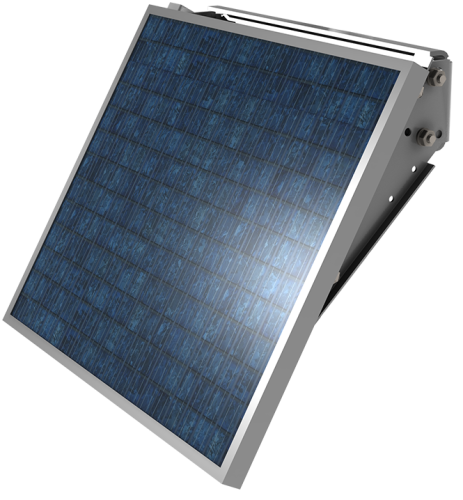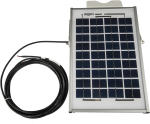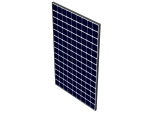
Overview
The SP20 is a 20 W solar panel. It is often used for system configurations that have higher-than-average power requirements, or in higher elevation and latitude locations. It connects to Campbell Scientific power supplies and battery bases to recharge the battery, and it allows unattended operation of systems in remote locations that are far from ac electrical sources.
Read MoreBenefits and Features
- Supplies electrical power in locations where ac power is unreliable, expensive, or not available
- Recharges the sealed rechargeable battery of a PS150, PS200, BP12 (requires CH150 or CH200), BP24 (requires CH150 or CH200), CR3000, CR5000, CR6, or CRVW3
Images




Similar Products
Detailed Description
The SP20's 15-ft cable has stripped and tinned leads that connect to the PS150, PS200, CH150, CH200, or battery base of the CR3000, CR5000, CR7, CR9000X, CR6, or CRVW3. A 788 connector must be soldered onto the solar panel leads to use the SP10 with a 21XL rechargeable base.
Included mounting hardware consists of two part no. 17492 U-bolt and matching nuts. The U-bolt has a 5.398 cm (2.125 in.) space between the U-bolt legs. This hardware allows the solar panel to be mounted to a 0.75-1.5 in. IPS pipe [25.4-50.8 cm (1-2 in.) OD].
Compatibility
Note: The following shows notable compatibility information. It is not a comprehensive list of all compatible or incompatible products.
Data Loggers
| Product | Compatible | Note |
|---|---|---|
| CR300 (retired) | The SP20 is compatible with the built-in regulator. | |
| CR3000 (retired) | (The SP20 is compatible with the built-in regulator.) | |
| CR310 | (The SP20 is compatible with the built-in regulator.) | |
| CR350 | The SP20 is compatible with the built-in regulator. | |
| CR6 | (The SP20 is compatible with the built-in regulator.) | |
| CRVW3 | (The SP20 is compatible with the built-in regulator.) |
Power Supplies
| Product | Compatible | Note |
|---|---|---|
| BP12 | ||
| BP24 | ||
| BP84 | ||
| CH150 | ||
| CH200 | ||
| CH201 | ||
| PS150 | (The SP20 is compatible with the built-in regulator.) | |
| PS200 | (The SP20 is compatible with the built-in regulator.) |
Additional Compatibility Information
Regulators
The SP20 is compatible with the CH150; the CH200; the CH201; or the regulator built into the PS150, PS200, CR6, CR3000, CR300, CR310, or CRVW3.
Batteries
The SP20 is compatible with the EnerSys Genesis NP series (such as PS150, PS200, BP12, BP24), EnerSys Cyclone series, or Concorde Sun Xtender series (such as BP84) batteries.
Specifications
| -NOTE- | Solar panel characteristics assume 1 kW m-2 illumination and 25°C solar panel temperature. Individual panels may vary up to 10%. The output panel voltage increases as the panel temperature decreases. |
| Cable Description | 20 AWG, 1-twisted pair |
| Maximum Peak Power | 20 W |
| Maximum Allowable Wind Gust Speed |
|
| Guaranteed Minimum Peak Power | 18 W |
| Current at Peak | 1.19 A |
| Voltage at Peak | 16.8 V |
| On-board Regulator Included | No |
| Cable Length | 4.572 m (15 ft) |
| Dimensions | 50.0 x 42.2 x 5.1 cm (19.7 x 16.6 x 2 in.) |
| Weight | 4.4 kg (9.6 lb) |
Documents
Technical Papers
Videos & Tutorials
Frequently Asked Questions
Number of FAQs related to SP20: 3
Expand AllCollapse All
-
The supplier of the SP20-series solar panels changed the wiring connections so that it is no longer possible to lengthen the cables without a splice. Splices can increase the risk of water penetrating the cable, so Campbell Scientific generally recommends not lengthening the cable. However, we can lengthen the cable upon special request. Contact us to discuss this further.
-
The CH100 Charge Controller is designed to work with maintenance-free deep-cycle lead-acid batteries. The voltage of the charger is slightly different than what is required to charge the marine-type flooded-cell battery. Therefore, Campbell Scientific recommends purchasing a deep-cycle battery, such as the BP12 or BP24, rather than a flooded-cell battery. Note that our regulated solar panels, such as the SP20R and SP10R, are intended to be used with, and connected directly to, a user-supplied flooded battery.
-
Regulators control the current flowing to the battery and prevent the battery current from flowing to the charging source. These solar panels do not include an on-board voltage regulator, so a stand-alone regulator would be required to complete a power supply.
Typically, these solar panels are connected to a CH100, CH200, PS100, or PS200, as well as to the battery base of a CR3000 or CR5000. The PS100 and the PS200, as well as the battery base of the CR3000 and CR5000, include an internal regulator.
Listed Under
- CRVW3 - Three-Channel Vibrating Wire Datalogger
- CRVW3-NE - Three-Channel Vibrating Wire Datalogger without Enclosure
- 18562 - PS100 12 V Power Supply with Charging Regulator but without Battery
- CH201 - 12 V Charging Regulator
- CR5000 - Measurement and Control Datalogger
- CR-PVS1 - Soiling Loss Index RTU for Photovoltaic Modules
- CH100 - 12 V Charging Regulator
- PS24 - 24 Ah Power Supply with 10 x 12 in. Enclosure
- 10518 - CR3000 or CR23X Sealed Rechargeable Battery Base
- 29290 - PS150 12 V Power Supply with Charging Regulator but without a Battery
- PS150 - 12 V Power Supply with Charging Regulator and 7 Ah Sealed Rechargeable Battery
- CH150 - 12 V Charging Regulator
- 22238 - PS200 12 V Power Supply with Charging Regulator but without Battery
- CR6 - Automated Monitoring Platform
- PS200 - Smart 12 V Power Supply with Charging Regulator and 7 Ah Rechargeable Battery
- CH200 - Smart 12 V Charging Regulator
Privacy Policy Update
We've updated our privacy policy. Learn More
Cookie Consent
Update your cookie preferences. Update Cookie Preferences



